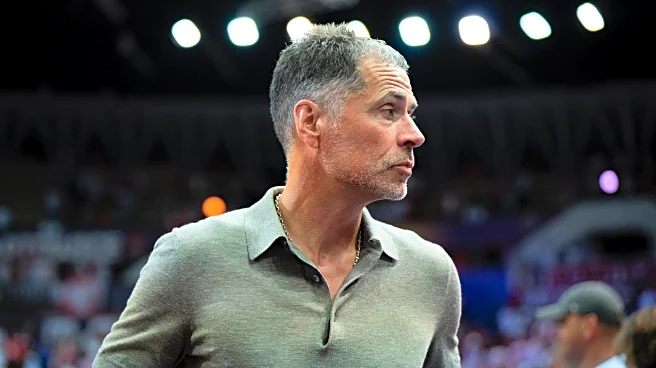What's Happening?
PBS is premiering 'The Gold,' a British drama series that recounts the 1983 Brink's-Mat robbery at Heathrow Airport, where six men stole 6,800 gold bars worth £26 million. The series focuses on the criminals' efforts to launder the gold and the police's attempts to recover it. Detective Chief Superintendent Brian Boyce, played by Hugh Bonneville, leads a special task force to solve the case. The series delves into themes of class, greed, and the overlap between cops and criminals, offering a detailed portrayal of the characters involved in the heist.
Why It's Important?
'The Gold' provides a nuanced exploration of crime and justice, highlighting the complexities of the criminal world and the challenges faced by law enforcement. By focusing on the aftermath of the heist, the series offers insights into the social and economic factors that drive criminal behavior. The portrayal of class dynamics and corruption within the police force adds depth to the narrative, prompting viewers to consider broader societal issues. The series may attract audiences interested in crime dramas and historical events, contributing to discussions on the portrayal of crime in media.
What's Next?
As 'The Gold' airs on PBS, it may generate interest in the historical Brink's-Mat robbery and its impact on British society. Viewers may engage in discussions about the series' themes, exploring the moral and ethical dilemmas faced by the characters. The series' reception could influence future crime dramas, encouraging filmmakers to explore complex narratives that address social issues. Additionally, the series may prompt viewers to reflect on the role of law enforcement and the challenges of maintaining justice in a corrupt system.
Beyond the Headlines
The series' focus on class and greed highlights the systemic issues that contribute to crime, prompting viewers to consider the broader implications of economic inequality. By portraying the human side of the criminals and law enforcement, 'The Gold' challenges stereotypes and encourages empathy for individuals caught in difficult circumstances. This narrative may inspire audiences to advocate for social change and policies that address the root causes of crime, promoting a more equitable society.










